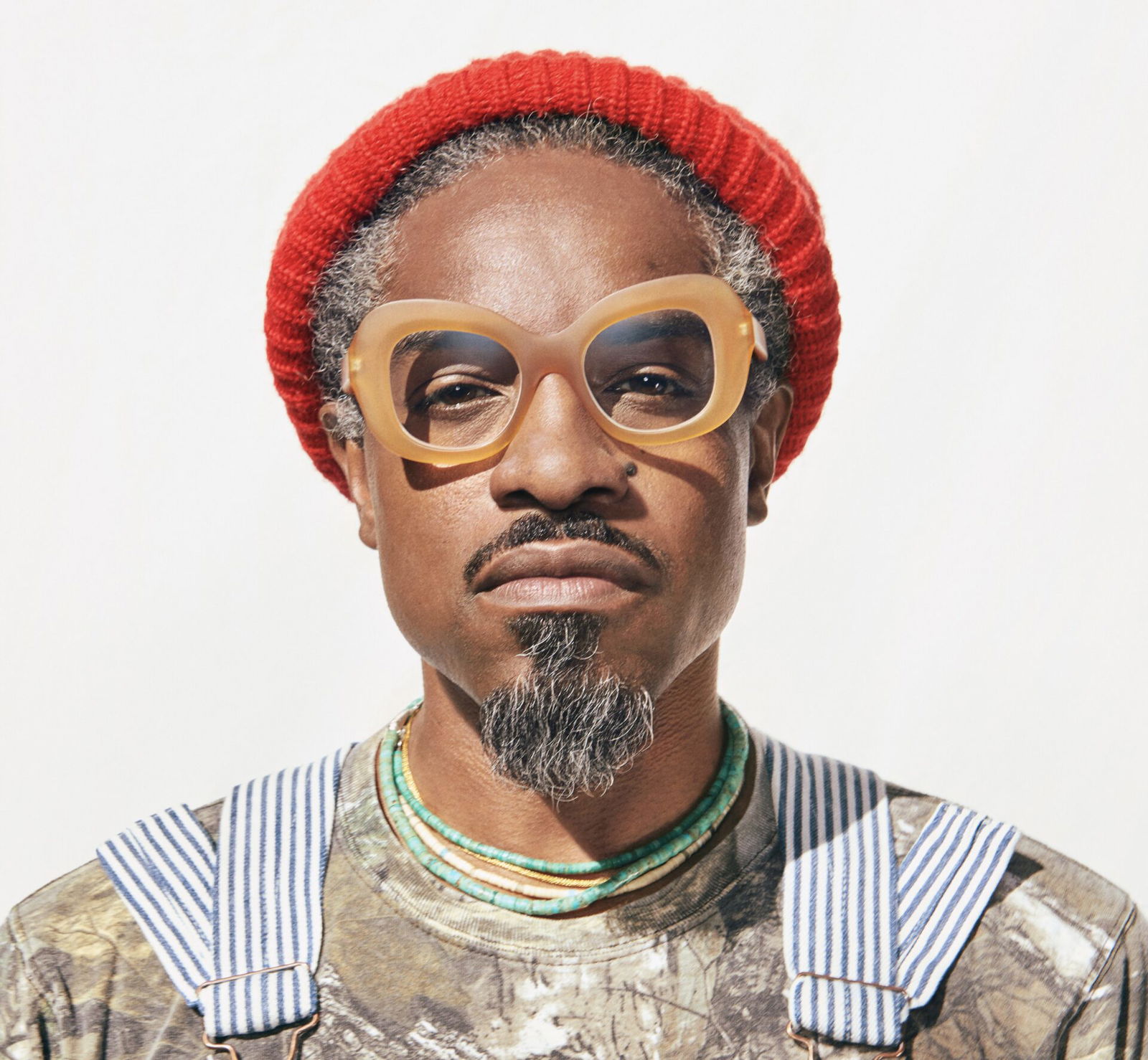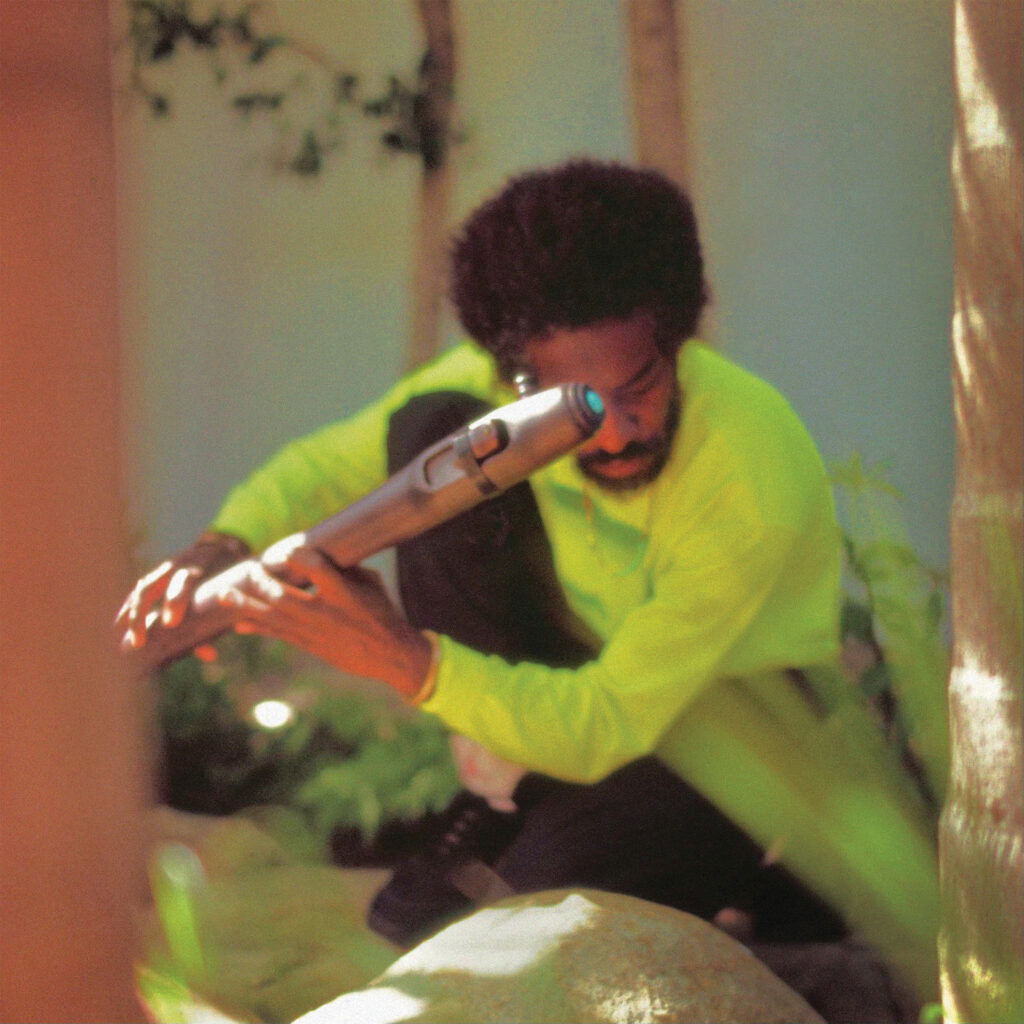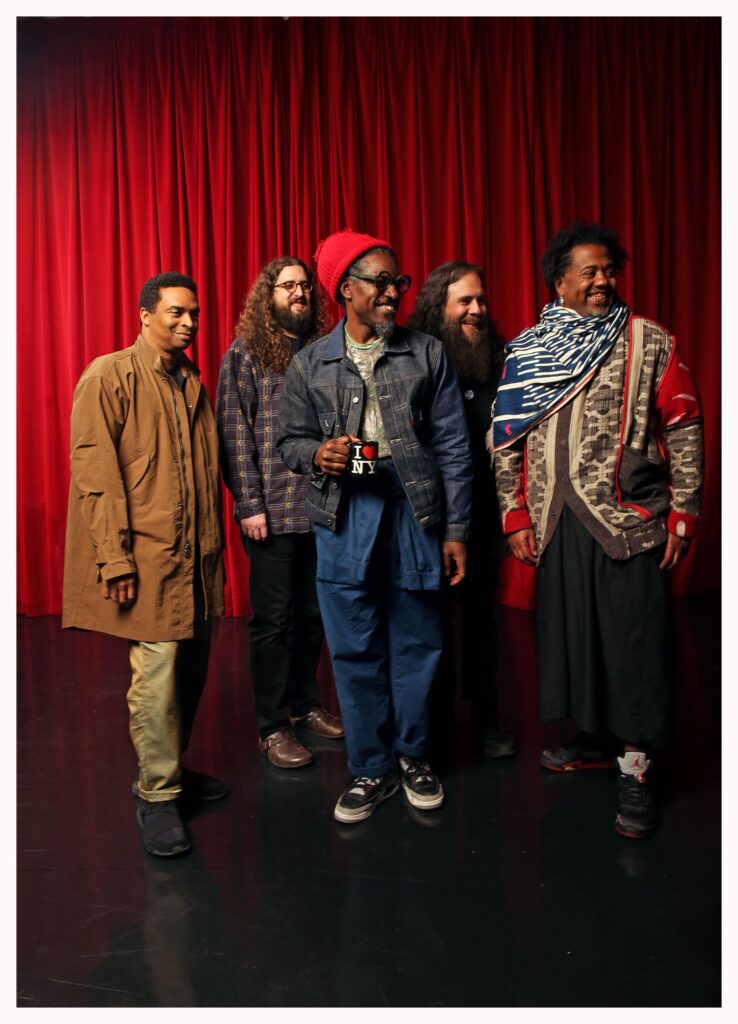
December 26, 2024
André 3000 Doesn’t Consider Himself A Flautist But ’New Blue Sun’ Is His Most ‘Honest’ Work
New Blue Sun is a synthesis of liberation and peace.
André Benjamin, one half of the award-winning hip-hop duo OutKast, known widely as André 3000, has been on a multi-city tour for New Blue Sun that kicked off June 2024 in Ontario, Toronto. Along the way, 3 Stacks, as he is also often referred to, made stops in Australia, Europe, Dallas, where Erykah Badu, who he shares an adult son with, joined him onstage; New York City at Brooklyn’s Academy of Music where he played alongside fellow musician Meshell Ndegeocello; Philly to play with Sun Ra icon and centenarian Marshall Allen; and concluded at the fabulous Fox Theatre in his hometown of Atlanta, where was joined onstage by fellow Dungeon Family member, Big Rube.

When André 3000 popped out to play the flute, folks weren’t ready for the shift. The hip-hop-performer-turned-flute performer was a novel concept that was very difficult to digest for rap fans. However, the instrumental album outsold several major rap albums—13 to be exact—in its first week sales, Fader reported. And one year later, it is on its second tour run.

As many should expect, the tour, New Blue Sun, offers an array of experiences. The first is the setlist. André and his talented bandmates birth a whole new arrangement each night through improvisation. Each live show was one of one and unique to its audience. Even the stage lighting must be acknowledged as a performance in and of itself as a mix of cross-colored highlights and lowlights that dance across the theater. An obligatory nod goes to the smoky sage that billows above the musicians–scenting the air and settling the spirit. The energy is as much a factor in the performance as the setting, the performers, and the melodies. The whole is a synthesis of liberation and peace.
BLACK ENTERPRISE caught up with André 3000 to discuss the New Blue Sun tour and the journey forward.
BE: I wanna get this right. Is it flutist or flautist?
André 3000: Flautist, but I would not consider myself a flautist.
Then tell me why.
Even though I play flute, I wouldn’t consider myself a flautist because l’m not trained in that way. I got to it in a very personal way, much in the same way I play guitar, but I’m not a guitarist. I can play a piano a little bit, but l’m not a pianist … l guess maybe I don’t feel like I’m on the level of my friends that actually play flute. So, yeah, I wouldn’t call myself a flautist in that way.
Thank you for that clarity and for the transition into the next question. Who are some of your favorite flautists?
Hariprasad Chaurasia. He’s an Indian player. He’s been around since like the 1960s and 70s, but he is to me like the god.
You talk about mastering one’s domain before claiming you are the master of it. And so, can we call you a lyricist?
Yes, well, I wouldn’t say master, but I’ve done it long enough to where I was doing it at such a level that I felt like I could be called a rapper, even though I’m not rapping as much now, but yeah. It’s all just titles.
Did you have a point of reference before you started or any particular artist you’ve used as an inspiration?
Yeah, a lot of indigenous native music to start with. Coltrane, Eric Dolphy, Pharoah Sanders. These are some of the greats. Even when you think of Sun Ra, these are people that laid it down for the basis of what we do now.
I’m really blown away by [Sun Ra’s] trajectory and their history. Do you see yourself occupying this space much longer or for the long haul, or is this just a moment for you?
As long as it’s feeding. I’ll definitely keep doing it. As long as there’s interest. We’ve been booked for shows, and we’ve done over 130 shows at this point.
It’s like the actual action of doing it is part of what it is. So yeah, we’ll definitely keep doing it.
You certainly have a foothold with audiences. Atlanta came to Piedmont Park for the Jazz Festival. Do you feel that with New Blue Sun, the audience is different, not just in size but in diversity?
Oh yeah, for sure. It’s completely different … You have some Outkast fans that come to this, but I think the crowd is a little more vast. Your older people. I met a guy at a Q&A, and he was like, ‘l’ve listened to all of you since the first time you ever come out; he’s like, this is your best album.’ It is different.
I’m really pleased with the nuance. When I heard it, much in the way when I heard Love Below, it tweaked my imagination in ways I wasn’t ready for. I really wanna thank you for that.
No, no—thank you. I’m kind of used to it at this point, you know, used to some people being on board, some people being too surprised, some people being not necessarily ready for it.
Yeah, a painter once told me that as an artist and as a creator, if you do not change the temperature of a room; shake up the room, disturb it or make people a little uncomfortable, then you really not creating art.
To be honest, it’s not a goal. You do hope to inject something new. I’m not necessarily trying to disrupt a thing; just pushing myself forward and hope people understand what’s happening, but I do understand where that kind of quote could come from. A lot of things that are normal now, started out as being really uncomfortable.
I’m reading this John Coltrane book and there’s one part in the book where [after a show] the promoter who brought him to Paris, [tells] Coltrane, Man, these people don’t understand what you’re doing and you’re kind of too far out.’ Coltrane’s response was like, no, I’m not, I’m not playing far enough. Now, we look at Coltrane’s like this is the norm. He is the God, but sometimes it takes a minute to push through certain things. Not comparing myself in that way … but I will say that time is the true teller of it all. I think sometimes we rate a thing a classic too early. Sometimes, it takes 10 to 20 years for you to know that it stands up in a certain way; that it’s not just hype. And sometimes, it takes a minute for people to onboard, and that’s fine.
In terms of performance, what goes into creating the ideal stage performance when you’re playing flute?
The ideal performance—it’s all feeling. I can’t really describe it, but it’s when me and the band are listening intently to each other … it’s as long as we feel like we’re journeying. We’re completely composing on the spot every night, so we don’t know which way it’s gonna go, which is awesome. It keeps you alive and in it, so you can never just check in, like, OK, here comes the chorus … the reward is greater because of that.
How do you want audiences to engage with the performance?
Just go along the ride with us and listen. That’s really what it’s about. Most people—when they leave the show—were like, ‘man, it made me think of so many things.’ So it’s really for you, your personal kind of whatever you’re into. It’s not really a show per se.
This writer rated the show, and he gave us a really, really bad write-up, and we were all joking after we read it because he was like he doesn’t get it because there were no solos. Well, we weren’t trying to do any of that. It wasn’t our intent to do these crazy solos because that’s kind of like a showy kind of thing we’re, we’re more about listening and responding.
So, it’s more experience than it is performance?
There is a performance aspect because we’re in front of the people presenting a thing, but really, we’re just presenting a moment for you to just share in it. It’s more of us listening and responding and catching something out of or inside of our brains.
The album is roughly 87 minutes long. Does the playlist consist of the entire album? Are you mixing things in? Are you just doing improv?
When we first started hitting the road, like our first few shows, we injected one or two melodies off of the album that people may recognize, but then we came to find out quickly that it was not in keeping with how it was made. That was kind of restrictive. It’s rewarding people … but when I recorded that tune, I made it up on the spot. So I had to actually relearn it to play it in front of a crowd … So, we’re completely making the whole thing up every time.
Whatever show you came to was specifically tailor-made for that day, and we’ll never be able to do it again, but we record everything. We’ll be able to look back 20 years and be like, ‘Oh yeah, that was that night in D.C.’
Are you proud of this history that you’ve created and this future that you are creating?
I’m really proud of just having the guts to follow what’s coming at me because in all honesty, it wasn’t a plan. It was never a plan. It was never like, yeah, I’m gonna stop this rapping and I’m gonna kill these niggas with this flute shit.
In the same way like it the same way Love Below came about, the same way “So Fresh, So Clean” and I never knew what was gonna be happening. I’m just happy I’m able to respond to what’s happening enough to do it … it just happened. I think that’s the best way to just be attentive enough to respond, and l’m happy that I was attentive enough to respond to where we are right now. I’m just a cog in it, you know, playing my part.
What do you want us, the public, and your supporters to know?
That we’re alive and listening. These performances may be the most honest thing you’ll get in a couple of years because it is live and direct, we’re not making it up. What’s happening is not for prosperity.
You’re a long way from DeKalb County, from Decatur, from Atlanta, and home is not necessarily a place, right? Today, what is home for you?
I live in Venice Beach, California; that’s home. When I get home off the tour, I go back to Cali.
OK, that’s where home is, but what is home for you?
Home is a comfort place, refuge. Where I can sit on the sofa and feel like I can just lay here and charge up. That’s home—anywhere you kinda go back to. Anywhere you go back to is home.
RELATED CONTENT: OutKast Receives First Diamond Single Certification